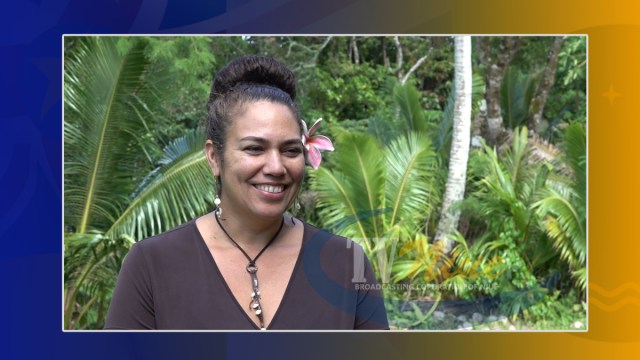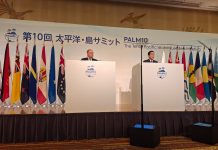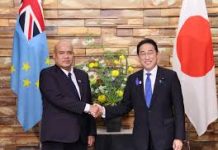In this two-part series, BCN Journalist Esther Pavihi speaks with Senior Advisor to the Director-General of the SPC, Coral Pasisi on Climate Finance, the Science and Security concerns of Pacific states like Niue, leading up to COP26. In Part One we talk about Climate Finance.
EP – We know that the host country Great Britain will want to push the agenda on the pledge from developed countries of 100 billion dollars a year in climate finance. However, for many small Pacific countries at the precipice of climate change, this so-called climate finance is very difficult to access.
What do you think are some of the ways that Pacific governments can overcome the challenges of accessing climate finance?
CP – “I think certainly the mobilisation of additional finance is really critical so reaching that 100 billion per annum is really important. I don’t think we’re there yet.
But I think what’s really concerning is that there really isn’t yet an agreed approach to determining what is climate finance so that it’s very clear. What is ODA, what is climate finance, what is concessional finance for other things?
I think that’s where the real challenge is because if you look at developing countries like Niue who are already spending their own recurrent budget on climate change issues, that is climate finance. So Niue is a donor of climate finance and so it really depends, it’s a little bit like smokes and mirrors if you don’t actually define what it is and I think that’s the first challenge that we have to continue to get clear.
The second main challenge is where is that climate finance channelled right now? So the big multi-lateral mechanisms like the GCF, the GEF Adaptation Fund, are what most people measure by way of allocation of climate finance, but those mechanisms are not developed for the lowest common denominator, for the small countries to access. So even though they’ve tried very hard to have special windows of access and things, it’s still fundamentally very challenging for small countries and small administrations to access that. So what happens is we see a need, the community sees a need, the government or the agency tries to get together to develop a proposal that meets the requirements and then three years later we get the funds, and sometimes five years later.
By that time, either the need has changed or you don’t have the capacity in the country to implement that particular activity so then it’s pushed out further, so that’s the vicious cycle of repetition for ODA in general but climate finance in particular because we have to meet certain requirements.
So I always look at it this way, you don’t ever cut off the chance to continue to apply for those multi-laterals, we should go to those for some projects, big ones especially but I think wherever possible small island states should pursue bi-lateral climate finance assistance into the mechanisms that are commensurate with their own absorbitive capacity, whether that’s through budget support in a government, whether it’s through trust fund arrangements and I think that’s what Minister Ainuu had raised that Niue’s developing its own innovative financing mechanism around ocean conservation and sustainability and that is developed commensurate with our own systems. And so if we can get climate finance into something like that, it’s much easier for us to disperse in the community systems the way that people are used to spending resources.
So going through your own systems is critically important and the final thing and I think one of the most important things for me is the capacity of small states to understand climate change let alone manage the funding to address it, is a capacity that is required because of climate change. It’s not something we created but we have to develop a workforce and pay for it to address it, so for me that capacity should be funded by climate finance. That’s the first incremental cost to a country to have to address climate change so I think we should be arguing for direct budgetary support to fund all the capability that is required by small island states to even start addressing climate change”.
EP – With those suggestions of strategies, do you think it’s best to come from a collective or a block of islands or as individual countries?
CP– “I think every single opportunity should be taken, but small island states are unique because they have small administrations so I think that they are much better placed to work together to say, “Hey we didn’t create this problem but we have to pay for the capacity to understand it and deal with it, but because we are small countries, it’s that additional capability and funding is actually costing us money that we would otherwise spend in schools and health care and other aspects”.
So, I think they should collectively go as small countries to say please capacity supplementation, training, and retention on all elements climate change and put it into a trust, a long term trust, budget support into governments and other community groups so they have that certainty. So, we can build experts but we can also pay for them to be employed otherwise we’re just training them up and they will leave and go straight to the big countries who are trying to deal with climate change now.
EP – How realistic do you think it is that at COP26 they will finally achieve the goal of accessing climate finance that the developed countries had pledged of $100 billion per year?
CP – “I think there are some good indications around an increase in commitments in financing for sure. A number of the big players have doubled their pledges this year, having the USA back in the Paris Agreement makes a very big difference and so that’s a good thing. But again, for me I think it comes down to – Would you rather have access to 100 billion dollars that you can’t access or a million dollars that you can access and you can disperse at a rate that is commensurate with your absorbitive capacity as a country, so I think we need to push these two things together.”
SOURCE: TV NIUE/PACNEWS


















